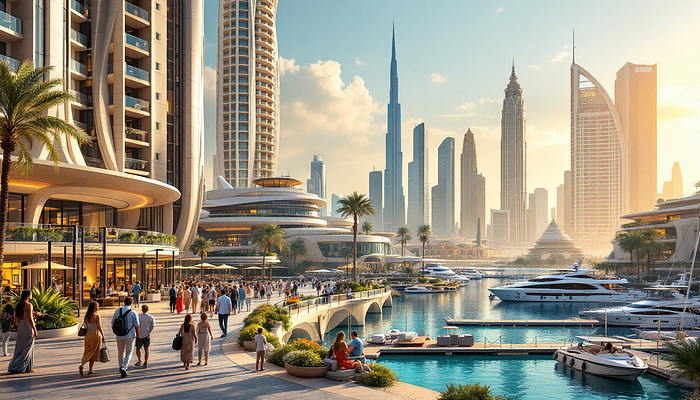Dubai’s real estate market has long been influenced by global events due to its role as a hub for business, tourism, and investment. In 2025, the interplay between global economic shifts, geopolitical realignments, and technological advancements is shaping new opportunities and challenges in the sector. This article explores key trends and how investors and developers can navigate them.

1. The Influence of Global Economic Conditions
Inflation and Currency Fluctuations
Inflationary pressures and fluctuating global currencies are reshaping investor behavior. The rising cost of construction materials, supply chain disruptions, and skilled labor shortages have led to increased property prices. Additionally, the trend of “de-dollarization” and the growing use of alternative currencies, including digital assets, are influencing investment decisions in Dubai’s real estate market. Investors are shifting towards stable assets like high-yield rental properties and commercial real estate to hedge against inflation risks.
Geopolitical Shifts and Investment Inflows
Dubai’s strategic position between Asia, Europe, and Africa makes it a prime beneficiary of shifting global power dynamics. The expansion of the BRICS+ alliance and increased trade partnerships with emerging economies have led to a surge in real estate investments from Asia, Africa, and Latin America. Additionally, the UAE’s evolving visa policies, such as the Golden Visa program, continue to attract long-term investors.
2. The Impact of Global Events on Market Demand
The Rise of “Metaverse-Adjacent” Real Estate
Dubai is at the forefront of blending physical and digital real estate through “phygital” developments. In 2025, expect to see:
- Smart residences with integrated AR/VR capabilities for immersive entertainment and remote work.
- Blockchain-based property ownership models enhance transparency and security in real estate transactions.
- Hybrid commercial spaces are designed for both physical and virtual business interactions.
Mega Events and Short-Term Booms
Major global events like Expo 2020 demonstrated Dubai’s ability to attract international attention and boost real estate demand. In 2025, events such as the Champions Trophy and global technology summits are expected to drive short-term rental demand and push new infrastructure projects. Short-term rental platforms are experiencing increased adoption, especially in areas near key event venues.
3. Sustainability and Climate-Resilient Development
Advanced Cooling and Energy Efficiency
With rising temperatures, developers are investing in:
- Innovative cooling technologies to reduce energy consumption in extreme heat.
- AI-driven energy management systems that optimize electricity and water use.
- Vertical farming integration in residential complexes to enhance food security and sustainability.
Coastal Adaptation and Infrastructure Resilience
As Dubai expands its coastline with artificial islands and waterfront developments, concerns about rising sea levels and coastal erosion are growing. The city is implementing advanced coastal defense strategies, including:
- Seawalls and flood barriers in vulnerable areas.
- Floating real estate projects are designed to withstand rising water levels.
- Sustainable drainage systems to manage heavy rainfall and prevent urban flooding.
4. AI-Driven Real Estate Investment and Management
AI is transforming real estate transactions, property management, and investment strategies. By 2025:
- Predictive analytics will be used to assess market trends and optimize pricing strategies.
- AI-powered property tours will allow buyers to explore homes remotely with immersive 3D visualization.
- Smart building management systems will reduce operational costs and enhance tenant experiences.
5. Emerging Real Estate Niches in 2025
Beyond traditional residential and commercial sectors, specialized real estate markets are expanding:
- Data centers: As Dubai becomes a global digital hub, demand for secure data storage facilities is rising.
- Healthcare real estate: With a growing focus on medical tourism and aging populations, senior living facilities and medical complexes are in high demand.
- Educational real estate: The rise of international universities and skill development centers is fueling demand for student housing and academic infrastructure.
- Esports and gaming spaces: With Dubai’s growing role in the global gaming industry, dedicated spaces for esports training and gaming events are emerging.
Optimizing Real Estate Strategies for 2025
Data-Driven Decision Making
Investors and developers should leverage AI-powered market insights and real-time analytics to identify high-growth areas and maximize returns.
Localized and Multilingual Content for Marketing
With an increasingly global investor base, real estate businesses should create content in multiple languages and tailor marketing strategies to different demographics.
Sustainability and ESG Compliance
Green building certifications and adherence to environmental, social, and governance (ESG) standards will become essential for attracting both institutional investors and end-users.
Smart Technology Integration
Adopting smart home technology, AI-driven security, and automated property management will enhance property value and attract tech-savvy buyers.
Conclusion
Dubai’s real estate in 2025 is shaped by global economic trends, technological advancements, and shifting investment patterns. The rise of AI-driven property management, climate-resilient architecture, and specialized real estate segments will redefine the sector. Investors who embrace these trends, leverage data-driven insights, and prioritize sustainability will be best positioned for success in Dubai’s evolving real estate landscape.




.png)
Comments